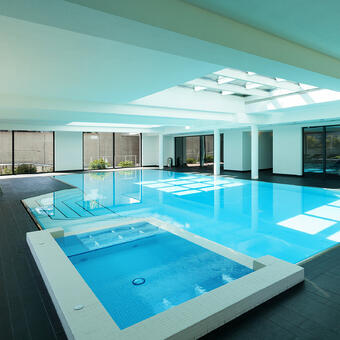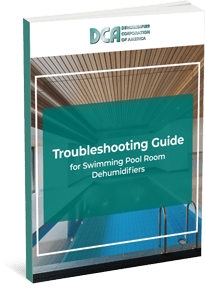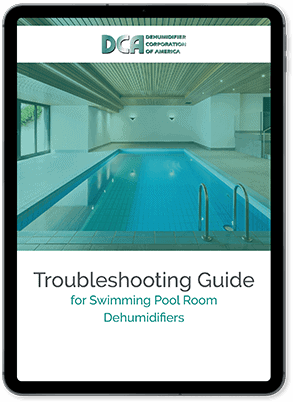Indoor pools add value and year-round enjoyment to your property, whether you have one in your hotel, gym, spa, or private residence. Maintaining appropriate water temperature is critical to continued pool satisfaction. Most indoor pool operators heat pool water 2–4°F below the pool room’s air temperature to minimize and control evaporation. They are increasingly using this to their advantage by installing commercial dehumidifiers that channel heat from the refrigeration cycle back into the pool room in the form of space heating or assist in pool water heating.
Considerations for Heating Pool Water
 Because most indoor pool room requirements are similar, pool owners have several different options to maintain proper water temperature. Indoor pools in different applications, such as commercial versus residential uses, can require different heating techniques. Pool size also factors into the chosen heating method, as larger pools require more energy to heat. These considerations determine which type of heater is the best fit for your specific pool.
Because most indoor pool room requirements are similar, pool owners have several different options to maintain proper water temperature. Indoor pools in different applications, such as commercial versus residential uses, can require different heating techniques. Pool size also factors into the chosen heating method, as larger pools require more energy to heat. These considerations determine which type of heater is the best fit for your specific pool.
Properly heating pool water also relies on your pool’s geographical location. In areas with year-round warm weather, sunlight and high outdoor temperatures may do most of the work for you, especially if your building uses a greenhouse-style design. However, if your facility experiences harsh winters or other adverse environmental conditions, you may have to dedicate more resources to counteract these elements. Most cold climates dictate a dedicated pool water heating system run on natural or LP gas, electricity or other sources. The dehumidifier pool water heating assist option can provide the bulk of the water heat needed during normal outdoor conditions.
Pools also tend to see different levels of usage during different times of the year. For example, hotel indoor pool usage during the warm months are used less because the available outdoor pool becomes the pool of choice. For facilities with varying rates of use, installing heating systems that you can easily adjust will result in energy expenses that more precisely match your pool’s actual needs.
Finally, pool patrons’ temperature preference also factors into how you heat your pool. When the pool is used for exercise or working out pool temperatures are kept at approximately 78°F, whereas pools seeking to provide more relaxing conditions, such as in very young or senior-care facilities, will maintain temperatures as high as 88°F. Average pool water temperature in hotels, motels or other commercial applications average around 80 F.
Use of a Dehumidifier For Indoor Pools Can Keep Heating Costs Down
 Pools in colder climates require a dedicated water heating systems to maintain desired temperatures. In general, water heaters that use natural (when available) or LP gas provide the least expensive option for long-term pool heating use. However, sometimes energy costs specific to your region will make electric, or heat pump more cost efficient.
Pools in colder climates require a dedicated water heating systems to maintain desired temperatures. In general, water heaters that use natural (when available) or LP gas provide the least expensive option for long-term pool heating use. However, sometimes energy costs specific to your region will make electric, or heat pump more cost efficient.
Many indoor pool owners are finding that owning a pool room dehumidifier, with optional pool water heating assist option, greatly improves their ability to regulate water temperature for the cost of running the dehumidifier alone.
A pool room dehumidifier with the pool water heating assist option can help you reduce heating costs. During the dehumidifier refrigeration cycle heat is generated which can be used to maintain desired pool room air temperature and, when satisfied, heat is then transferred to heating pool water, creating an efficient loop. These dehumidifiers work best for pools with large surface areas, especially in commercial environments but can be used in any pool application. They also work well in warm climates where outdoor conditions tend to overheat the desired room air temperature. When the dehumidifier is in the pool water assist heating mode, the result is the dehumidifier is now acting to add cooling to the pool room like an air conditioner would work. When a pool water heating assist dehumidifier is used a dedicated pool room heating source must be in place as well.
Dehumidifiers also reduce energy costs. Recovering heat from the dehumidifier refrigeration cycle and channeling it back into pool water can sometimes heat the pool on its own, without relying on dedicated water heaters operating during certain times of the year.
Finally, dehumidifiers can control mold and mildew buildup as well as corrosion by reducing the moisture content in the air limiting condensation on cold surfaces. A properly functioning dehumidifier will increase your pool room’s air quality and reduce health risks to swimmers and employees.
Working with DCA
DCA has designed multifunction indoor swimming pool dehumidifiers that maintain optimal indoor pool environments for a variety of facilities. DCA dehumidifiers can come equipped with a wide variety automatic controls suited to your needs that regulate pool room air temperature and pool water temperature.
To learn more about how our dehumidifiers will help maintain a consistent pool environment in your facility, contact our team today.





